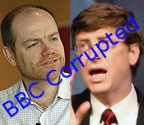Protests in London and Manchester on Tuesday, August 14  >
>
Read the report from the protest - with pictures
Imagine a world where you can buy whatever radio or television set you wish and still be able to tune into the BBC. Imagine if you could record a show on your VCR or a radio broadcast on your tape recorder. A world where the BBC uses free and open standards for radio and television to reach more people in the world than any other broadcasting corporation. This is the world as we've known it for over thirty years.
What if I told you that the BBC had decided to use secretive and proprietary standards? That they were implementing technology that would restrict what you can use to watch BBC programming and when you can watch it? That the software they are distributing would make decisions about what was on your computer? That the BBC had decided to give an exclusive deal for all Internet video broadcasting to just one company? That you had to buy this company's product if you wanted to view BBC television programming on your computer?
The deal made between the BBC and Microsoft does exactly that.
The BBC Tradition
It wasn't always so. The BBC has a long history of doing the right thing, and for supporting open access. One of the most recent battles came in 2003 when the BBC decided not to encrypt satellite transmissions, even though it was said that Rupert Murdoch's Sky satellite network would remove the BBC from the Electronic Programming Guide (EPG) listing. Piling on the pressure, the US media companies said they would not supply the BBC if its broadcasts were unencrypted. But in the end the BBC stood firm. Murdoch and US media were the ones who capitulated.
The BBC doesn't need encryption, and it certainly doesn't need Microsoft.
The Alternative
The BBC is an amazing source of programming and has a huge catalog to offer its online audience. There is no need to use Digital Restrictions Management (DRM) just because Murdoch and Gates say they must. If other media companies don't want to distribute via the BBC iPlayer, then fine. But in the long-term they will be cutting off their nose to spite their face—and so they won't stop providing content to the BBC to broadcast.
The BBC should have chosen free and open standards that work well and are available today. They should have chosen off-the-shelf software that costs nothing and that you have complete control over. Software that you can ask a programmer to fix or improve. Software that you can install on every major operating system including Microsoft's—Free software.
Instead, they have given Microsoft complete control. BBC programming is in the hands of a US-based corporation, and the BBC has given up the fight for open access. The public is being asked to take it on faith that the BBC will eventually provide support for other operating systems. Who knows when, or if, it will ever run on other platforms like GNU/Linux. And whether they will ever respect the rights of computer users to be in control of their computers. The decision to use DRM suggests equal access will never be an option.
This deal isn't about supporting Microsoft Windows users. It's about excluding everyone who doesn't use Microsoft Windows. It says that everyone who does not agree to use DRM and proprietary software made by Microsoft cannot view BBC TV programs over the Internet.
Who are the people responsible for creating this mess?
- Mark Thompson, BBC director general (DG)
- Erik Huggers, group controller at BBC Future Media & Technology
- Ashley Highfield, director of new media and technology
Right now, there is very considerable concern within the BBC that the actions of the Director General and his team are sending the corporation in the wrong direction. The BBC has been embroiled in a number of recent controversies, all linked back to the DG's leadership.
Controversies have included misrepresenting the Queen in a BBC documentary, and a scandal over faked phone-in competitions. The iPlayer appears to be another facet of the same problem, an organization whose leadership has stopped setting the high standards of integrity we expect
from the BBC.
The integrity of the BBC depends upon good governance and leadership, and a healthy respect for the BBC charter. I suggest that Mark Thompson needs to clean up the mess he has made, and ensure that he and his Microsoft cheerleaders, Erik Huggers and Ashley Highfield, break their ties with Microsoft, before the reputation of the BBC is permanently damaged.
Let's face it, seeing the BBC, one of the most beloved institutions, team up with Microsoft, several times convicted abusive monopolist, is not a recipe for confidence in the DG.
The basic problem is that DRM is completely contrary to what the BBC stands for. The BBC has always provided content free and without restriction to the British license-fee payers, and it needs to return to its basic principles.
DRM is the problem here and it must be eliminated from the BBC.